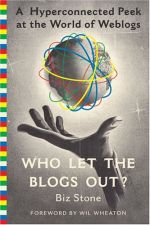Ethical Blogging
It was discovered through later research that this blog was a hoax. This teaches me as a blog reader to always remember that you do not know who the writer may be. According to the Cybertext Yearbook 2000 by Jill Walker there is a model of narrative communication used in most forms of writing. There is the “real author,” “implied author,” “narrator,” “narratee,” “implied reader,” and “real reader.”
This example comes into play with the phoney blog created that Stone mentioned in his book. The “real author” was the teenage girl who was creating the “implied author” of this female with an illness. Was creating this character an ethical way for the “real author” to treat her “real readers?”
I, myself was in a similar situation over the summer. But I was not creating a fake blog as a way to manipulate the readers for my own enjoyment, like I assume was the goal of the hoax blog's writer. I thought the blog would be an interesting way to promote a movie that the production company I was working for this summer had created.
Double R Productions, was creating a moc-umentary entitled Farmland Security. I thought it would be interesting to create a blog that followed the characters through the situations that was unfolding. Which to the audience the movie was supposed to be an actual documentary. (Think Blair Witch Project with a political spin.) The blog would not be displayed as an advertisement for the movie, but as a real blog that would hopefully entice its readers to want to see the movie that would play out the actual events of this blog.
Unfortunately this idea never got off the ground. I did not know very much about blogs at the time and I was not sure of how to exactly go about starting a blog. But after reading the Stone article I am now grateful that I did not create the blog. I do not think it would have been ethical to create a false blog. It seems wrong to manipulate my "real audience" by creating an "implied author."



